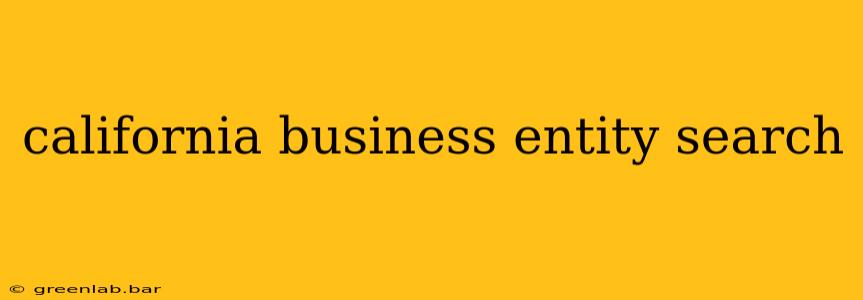Finding information on California businesses is easier than you might think. Whether you're conducting due diligence for an investment, researching a competitor, or simply satisfying your curiosity, understanding how to perform a California business entity search is crucial. This comprehensive guide will walk you through the process, outlining the various resources available and offering tips for a successful search.
Understanding California Business Entities
Before diving into the search process, it's essential to understand the different types of business entities in California. This will help you refine your search and ensure you find the precise information you need. Common business entity types include:
- Corporations: These are separate legal entities from their owners (shareholders), offering liability protection.
- Limited Liability Companies (LLCs): LLCs combine the benefits of corporations (liability protection) with the simplicity of a partnership or sole proprietorship.
- Partnerships: Businesses owned and operated by two or more individuals.
- Sole Proprietorships: Businesses owned and operated by a single individual.
How to Perform a California Business Entity Search
California's Secretary of State provides a robust online search tool for accessing business entity information. This is the primary resource for most searches.
1. Accessing the California Secretary of State's Website
Begin by navigating to the California Secretary of State's website. Their Business Programs section houses the tools you need.
2. Utilizing the Business Search Tool
The website provides a user-friendly interface for searching by:
- Business Name: This is the most common method. Enter the exact name as it appears on official documents, being mindful of capitalization and punctuation.
- File Number: If you already know the business's file number (also known as a business identification number), using this will yield the most precise results.
- Agent for Service of Process (ASOP) Name: This is the individual or entity designated to receive legal documents on behalf of the business.
3. Interpreting Search Results
Once you've submitted your query, the search results will display pertinent information, potentially including:
- Business Name: The official name of the business entity.
- Business Type: The legal structure of the business (e.g., corporation, LLC).
- Filing Date: The date the business was registered with the state.
- Status: The current status of the business (e.g., active, suspended, dissolved).
- Registered Agent: The designated agent for service of process.
- Principal Business Address: The main business location.
- Officers and Directors (for Corporations): A list of key personnel.
- Members (for LLCs): A list of the company's members.
Keep in mind that some information may be subject to fees for access.
Beyond the Secretary of State's Website
While the Secretary of State's website is the primary source, other resources can provide supplementary information:
- County Clerk's Office: Depending on the nature of your search, county records might offer additional details, like local business licenses.
- Commercial Databases: Several commercial databases offer more comprehensive business information, including financial data, but often come with subscription fees.
Tips for a Successful Search
- Be precise: Use the exact business name and any other known information (e.g., filing number) for accurate results.
- Consider variations: Try different spellings or slight variations of the business name if your initial search yields no results.
- Check for dissolved entities: If the business is no longer active, its information might still be accessible in archived records.
Conclusion
Performing a California business entity search is a straightforward process with readily available resources. By understanding the different entity types and effectively using the Secretary of State's website and other supplementary resources, you can efficiently gather the information you need for personal or professional purposes. Remember to always double-check the accuracy of the information obtained and consult with legal professionals if necessary.

